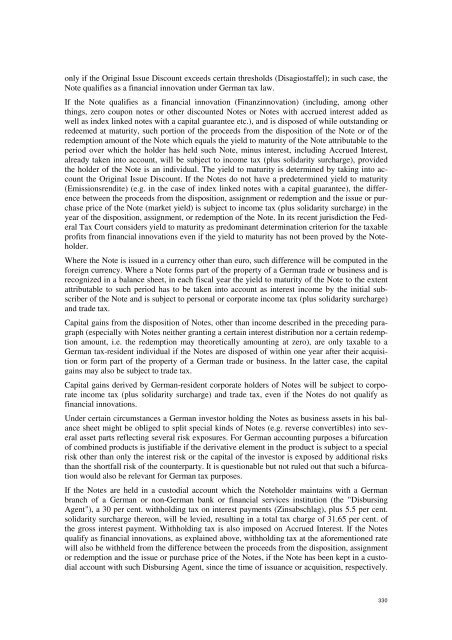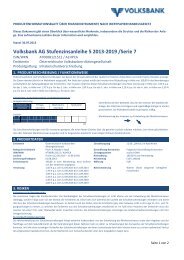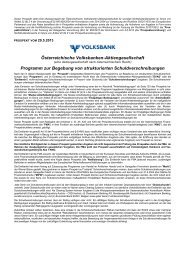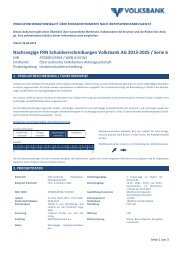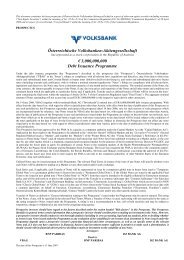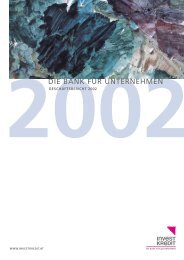- Page 1 and 2:
This document constitutes the base
- Page 3 and 4:
spectus nor to advise any investor
- Page 5 and 6:
SOURCES OF INFORMATION Statistical
- Page 7 and 8:
9. GENERAL INFORMATION ............
- Page 9 and 10:
the price specified in the Final Te
- Page 11 and 12:
Terms and Conditions of the Notes).
- Page 13 and 14:
or Covered Bonds, as described in "
- Page 15 and 16:
Operational risk There is a risk of
- Page 17 and 18:
No active liquid trading market - R
- Page 19 and 20:
1.4 German translation of the summa
- Page 21 and 22:
Optionsscheine und Turbo-Zertifikat
- Page 23 and 24:
Nicht-nachrangige Schuldverschreibu
- Page 25 and 26:
Herabstufung des Rating Es besteht
- Page 27 and 28:
punkten und in welcher Höhe Zinsen
- Page 29 and 30:
Summe der Aktiva 67,429,317 Zinsüb
- Page 31 and 32:
Měny: Pod podmínkou dodržení v
- Page 33 and 34:
le dluhopisu, u Krátkodobých pod
- Page 35 and 36:
ude vypracována pouze nezávazná
- Page 37 and 38:
Společnost VBAG vystavila podpůrn
- Page 39 and 40:
jako jsou například dluhové či
- Page 41 and 42:
právnymi alebo regulačnými obmed
- Page 43 and 44:
notes počas prvých dvoch rokov ic
- Page 45 and 46:
anglický jazyk a podľa určenia v
- Page 47 and 48:
Rizikové faktory týkajúce sa Not
- Page 49 and 50:
(equity securities), vrátane ale n
- Page 51 and 52:
1.7 Slovenian translation of the su
- Page 53 and 54:
Nakupni boni in Certifikati: Vredno
- Page 55 and 56:
jev: morajo biti poplačani pred dr
- Page 57 and 58:
Tveganja, ki se nanašajo na izdaja
- Page 59 and 60:
pa dogovorjeni pogoji ne nastopijo,
- Page 61 and 62:
Pregled poslovanja VBAG je splošna
- Page 63 and 64:
Pénznemek: A vonatkozó jogi és s
- Page 65 and 66:
telek vonatkoznak. Az Alárendelt T
- Page 67 and 68:
ák jog az irányadó. Joghatóság
- Page 69 and 70:
A VBAG-ra vonatkozó kockázati té
- Page 71 and 72:
szege részvények, hitelviszonyt m
- Page 73 and 74:
2. RISK FACTORS Prospective investo
- Page 75 and 76:
equire more time, management attent
- Page 77 and 78:
The trading market for debt securit
- Page 79 and 80:
In addition, there is a risk that a
- Page 81 and 82:
price risk and, if there are change
- Page 83 and 84:
Instalment Notes The Issuer may iss
- Page 85 and 86:
Index Linked Notes Index linked Not
- Page 87 and 88:
ket of shares), index (or basket of
- Page 89 and 90:
3. DESCRIPTION OF THE ISSUER Busine
- Page 91 and 92:
Retail This business division provi
- Page 93 and 94:
The plausibility and reliability of
- Page 95 and 96:
In 2006, special emphasis was place
- Page 97 and 98:
Rank Name of Bank 1 Bank Austria Cr
- Page 99 and 100:
Administrative, Management, and Sup
- Page 101 and 102:
Advisory Council - Volksbank Invest
- Page 103 and 104:
Members: Harald BERGER Edwin REITER
- Page 105 and 106:
Walter ROTHENSTEINER Thomas WIESER
- Page 107 and 108:
Michael PESCHKA Gerhard REINER Othm
- Page 109 and 110:
Major shareholders Shareholder stru
- Page 111 and 112:
Consolidated Income Statement of VB
- Page 113 and 114:
4. THE AUSTRIAN BANKING SYSTEM Over
- Page 115 and 116:
In addition to its functions within
- Page 117 and 118:
all Austrian provincial mortgage ba
- Page 119 and 120:
5. TERMS AND CONDITIONS OF THE NOTE
- Page 121 and 122:
(2) Senior Notes. Notes that are sp
- Page 123 and 124:
Interest Payment Date following imm
- Page 125 and 126:
(ii) Underlying is an index. For Un
- Page 127 and 128:
If on any determination date in rel
- Page 129 and 130:
Part F - Notes with other interest
- Page 131 and 132:
time in the case of EURIBOR, or the
- Page 133 and 134:
The number of days in the Calculati
- Page 135 and 136:
time at its Early Redemption Amount
- Page 137 and 138:
Subordinated Capital Notes shall ha
- Page 139 and 140:
If on the date the Notes are actual
- Page 141 and 142:
deemed to be, derived from sources
- Page 143 and 144:
Calculation Agent: The Calculation
- Page 145 and 146:
Notes. In the case of such substitu
- Page 147 and 148:
5.2 Supplementary Terms and Conditi
- Page 149 and 150:
earlier of (i) the actual closing t
- Page 151 and 152:
§ 4c (Delivery of Underlyings) (1)
- Page 153 and 154:
5.3 Form of Final Terms for Notes D
- Page 155 and 156:
7. Business Day Convention: Followi
- Page 157 and 158:
17. Method of distribution: non-syn
- Page 159 and 160:
- Interest commencement date: [�]
- Page 161 and 162:
[the begin] [the end] of each Inter
- Page 163 and 164:
justment of underlyings / market di
- Page 165 and 166:
(iii) IRR-period Amount. - commence
- Page 167 and 168:
(i) Redemption amount linked to the
- Page 169 and 170:
(i) Redemption Date(s): [�] (ii)
- Page 171 and 172:
36. Form of Notes: Permanent Global
- Page 173 and 174:
amount [�] (give details) 44. Not
- Page 175 and 176:
LISTING AND ADMISSION TO TRADING AP
- Page 177 and 178:
[[Other]: [�]] [Need to include a
- Page 179 and 180:
8. DUAL REDEMPTION NOTES 11 not app
- Page 181 and 182:
(4) Verbriefung. Je nachdem, wie in
- Page 183 and 184:
(a) Fundierte Schuldverschreibungen
- Page 185 and 186:
(4) Basiswertabhängige Verzinsung.
- Page 187 and 188:
(A) anstatt von der ursprünglichen
- Page 189 and 190:
den, wird der Feststellungstag gem
- Page 191 and 192:
den in den Endgültigen Bedingungen
- Page 193 and 194:
ternational Swap and Derivatives As
- Page 195 and 196:
iode kann in den Endgültigen Bedin
- Page 197 and 198:
(c) Bei "Rückzahlung mindestens zu
- Page 199 and 200:
(7) Vorzeitige Rückzahlung bei Vor
- Page 201 and 202:
tin ist (i) nach Ablauf von zwei Ja
- Page 203 and 204:
tentin nicht unter das Mindesteigen
- Page 205 and 206:
(b) wegen gegenwärtiger oder früh
- Page 207 and 208:
§ 9 (Beauftragte Stellen) (1) Best
- Page 209 and 210:
(2) Bezugnahmen. von dem Land (oder
- Page 211 and 212:
(2) Gerichtsstand. Nicht-ausschlie
- Page 213 and 214:
Berechnungsstelle festgestellt, vor
- Page 215 and 216:
oder Maßgeblichen Optionenbörse a
- Page 217 and 218:
der Berechnungsstelle auf der Grund
- Page 219 and 220:
5.6 German version of form of Final
- Page 221 and 222:
3. Art der Emission: Daueremission
- Page 223 and 224:
14. Vorzeitige Rückzahlung nach Wa
- Page 225 and 226:
(iv) Sonstige Einzelheiten zur Zins
- Page 227 and 228:
(viii) Zinsberechnungsbasis (A) Zin
- Page 229 and 230:
andere (Details einfügen) (vii) Fe
- Page 231 and 232:
(iv) Sonstige Einzelheiten zur Zins
- Page 233 and 234:
vierteljährlich monatlich [�] (a
- Page 235 and 236:
30. Vorzeitige Rückzahlung nach Wa
- Page 237 and 238:
ZUSÄTZLICHE BESTIMMUNGEN FÜR AKTI
- Page 239 and 240:
39. Finanzzentrum (-zentren) oder a
- Page 241 and 242:
Wien Clearstream Banking AG, Frankf
- Page 243 and 244:
[ANNEX - Zusätzliche Steuerinforma
- Page 245 and 246:
[S&P: [�] [Moody's: [�]] [ander
- Page 247 and 248:
7. INDEXGEBUNDENE SCHULDVERSCHREIBU
- Page 249 and 250:
specified denominations) specified
- Page 251 and 252:
(3) Minimum redemption amount ("Flo
- Page 253 and 254:
If the Underlyings (or components o
- Page 255 and 256:
(b) Underlying is an index. For Und
- Page 257 and 258:
Early Redemption Amount for the Cer
- Page 259 and 260:
(2) Payments on a Business Day. If
- Page 261 and 262:
Calculation Agent: The Calculation
- Page 263 and 264:
are listed. Publications relating t
- Page 265 and 266:
Form of Term Sheet for Index-Certif
- Page 267 and 268:
Form of Term Sheet for Bonus-Certif
- Page 269 and 270:
5.8 Form of Final Terms for Certifi
- Page 271 and 272:
(i) Start Date: See Offer Table (ii
- Page 273 and 274:
(viii) Minimum Redemption Amount ("
- Page 275 and 276:
24. ISIN Code: See Offer Table 25.
- Page 277 and 278:
1. LISTING PART B - OTHER INFORMATI
- Page 279 and 280:
(ii) Estimated net proceeds: 27 [
- Page 281 and 282:
(3) Stückelung. Die Zertifikate we
- Page 283 and 284:
Tilgungsbetrag = (Ausübungskurs -
- Page 285 and 286:
kontrakten an der Maßgeblichen Opt
- Page 287 and 288:
oder Wandelrechten auf Aktien, Auss
- Page 289 and 290:
oder mehrerer in einem Basiswertkor
- Page 291 and 292:
Betrag (wenn nicht in EB Punkt 19(i
- Page 293 and 294:
(4) Kosten. Alle im Zusammenhang mi
- Page 295 and 296:
§ 15 (Schuldnerersetzung) (1) Erse
- Page 297 and 298:
che Irrtümer zu berichtigen, wider
- Page 299 and 300:
Muster des Angebotsblattes für Dis
- Page 301 and 302:
Muster des Angebotsblattes für Tur
- Page 303 and 304:
Diese Endgültigen Bedingungen stel
- Page 305 and 306:
14. Bestimmungen zur Tilgung (i) Ba
- Page 307 and 308:
(i) Kündigungstag(e): [�] terabs
- Page 309 and 310:
[�] (andere einfügen) 30. Anwend
- Page 311 and 312:
[S&P: [�] [Moody's: [�]] [ander
- Page 313 and 314:
Zusicherungen wird keine weitergehe
- Page 315 and 316:
(4) Representation. The Warrants ar
- Page 317 and 318:
Exercise Notice to the Warrant Agen
- Page 319 and 320:
Exchange Business Days mean days on
- Page 321 and 322:
The Issuer shall be authorised in a
- Page 323 and 324:
§ 11 (Early redemption) (1) Waiver
- Page 325 and 326:
(7) Repurchase. The Issuer has the
- Page 327 and 328:
(4) No obligation. Neither the Issu
- Page 329 and 330:
city or country. Notice of all chan
- Page 331 and 332: notice shall be deemed to have been
- Page 333 and 334: Form of Term Sheet for Warrants Ter
- Page 335 and 336: change in the affairs of the Issuer
- Page 337 and 338: (ii) Germany: not applicable no pub
- Page 339 and 340: Aktiengesellschaft [�] (insert na
- Page 341 and 342: RESPONSIBILITY The Issuer accepts r
- Page 343 and 344: [[Other]: [�]] [Need to include a
- Page 345 and 346: 5.13 German version of the Terms an
- Page 347 and 348: zeichnet wird, kann das Optionsrech
- Page 349 and 350: § 8 (Schlusskurs. Ersatzkurs) (1)
- Page 351 and 352: § 9 (Marktstörung) (1) Marktstör
- Page 353 and 354: der Maßgeblichen Optionenbörse ge
- Page 355 and 356: § 11 (Kündigung) (1) Kündigungsa
- Page 357 and 358: (siehe EB Punkt 25(i)) (jeweils ein
- Page 359 and 360: spätestens am fünften Geschäftst
- Page 361 and 362: Zahlstelle: Eine (oder mehrere) in
- Page 363 and 364: (3) Bekanntmachung und Wirksamwerde
- Page 365 and 366: Muster des Angebotsblattes für Opt
- Page 367 and 368: Diese Endgültigen Bedingungen stel
- Page 369 and 370: gemäß § 3 (1) Z 9 Kapitalmarktge
- Page 371 and 372: Nachtrag zum Prospekt gemäß Artik
- Page 373 and 374: sten Jahresberichts oder Zwischenbe
- Page 375 and 376: [S&P: [�] [Moody's: [�]] [ander
- Page 377 and 378: diesen Zusicherungen wird keine wei
- Page 379 and 380: 7. TAXATION This section on taxatio
- Page 381: Non Residents Interest, including A
- Page 385 and 386: of the underlying is only taxable i
- Page 387 and 388: Corporations and individuals holdin
- Page 389 and 390: Corporations There is no withholdin
- Page 391 and 392: worldwide basis that is both on the
- Page 393 and 394: In the case of capital gains earned
- Page 395 and 396: Where the interest are made on Note
- Page 397 and 398: 3. other persons. The succession of
- Page 399 and 400: Capital gains (i.e. the difference
- Page 401 and 402: Slovak income tax regarding warrant
- Page 403 and 404: if the Slovenian resident would pay
- Page 405 and 406: the use of exemption method for avo
- Page 407 and 408: contract. Property shall mean real
- Page 409 and 410: 3. at any time to any legal entity
- Page 411 and 412: 9. GENERAL INFORMATION 1. Applicati
- Page 413 and 414: 10. STATEMENT PURSUANT TO COMMISSIO


